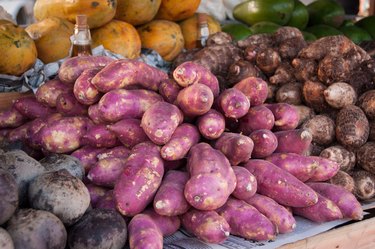
The sugar molecule is the simplest form of carbohydrate, according to MayoClinic.com. Sugar gets absorbed into the bloodstream and becomes blood sugar, or glucose, where it acts as fuel for your entire body for functions ranging from breathing to jogging. Your body can also store some sugar for later use. Sugar naturally occurs in many foods, but it can also be added to foods to enhance flavor. Foods with natural sugars tend to be the healthiest for you.
Considerations
Video of the Day
A simple-carbohydrate unit contains one sugar molecule or a chain of two sugar molecules. Complex carbohydrates, which have a chain of three or more sugar molecules per unit, are known as starches. Your body breaks all carbohydrates down – or attempts to break them down – into single sugar molecules, which it can then pass into the bloodstream. Depending on your body's energy needs, the sugar in your blood travels to your brain, kidneys, muscles or heart, or gets stored as energy for later. Sugars added to foods are simple sugars, but simple sugars exist naturally in a variety of healthy foods. Your body doesn't know the difference between naturally occurring simple sugars and added simple sugars.
Video of the Day
Risks of Added Sugars
Blood sugar that exceeds your immediate needs and your body storage capacity turns into stored fat. Therefore, adding sugar to food just tacks on calories that might contribute to weight gain from excess body fat. Adding table sugar to coffee or cereal, and regularly munching on foods such as candy, nondiet soda, syrups and other sweetened foods can crowd out more nutritious sources of calories from your diet.
Fruits
Fruits contain the natural sugars sucrose and fructose, but they are healthier options than foods with added sugars because they also offer you essential nutrients such as potassium, vitamin C and folate. Opt for whole fruits over dried fruits and fruit juices, as they tend to contain fewer calories due to a lower concentration of natural sugar. Whole fruits offer the added advantage of water and bulk in the form of the indigestible carbohydrate fiber, which helps you feel satiated on fewer calories, according to MayoClinic.com.
Milk and Vegetables
Milk contains a simple sugar known as lactose, which is made of the simple sugars glucose and galactose. Milk offers calcium, protein, and a variety of minerals and vitamins, but stick to low-fat varieties and avoid dairy products that contain added sugars to keep your caloric intake down. Certain vegetables, such as carrots, beets and sweet potatoes, also contain natural sugars, but like whole fruits, they have greater nutritional value than foods that contain added sugars.
Daily Carbohydrate Needs
About 40 to 60 percent of your calories should come from carbs, ideally from natural sugars and complex carbohydrates, according to MedlinePlus. Most adults need about 2 to 3 cups of vegetables, 1.5 to 2 cups of fruits, 3 cups of dairy and 5 to 8 ounces of grains per day. Eating more whole grains and limiting your intake of refined grains, such as white rice and white bread, will help you maintain your weight. Whole grains, such as brown rice and oatmeal, help you maintain a lower-calorie diet because they are rich in stomach-filling fiber. The U.S. Department of Agriculture recommends making at least half of your daily grains whole grains.